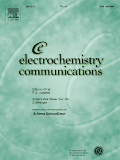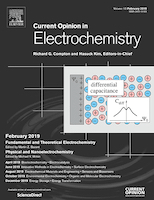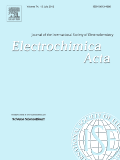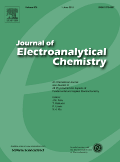
Analytical & Bioanalytical Electrochemistry
Scope & Guideline
Innovating Analytical Techniques for Tomorrow's Challenges
Introduction
Aims and Scopes
- Electrochemical Sensing and Biosensing:
The journal extensively covers topics related to the development of electrochemical sensors and biosensors, focusing on the detection of various analytes such as heavy metals, pharmaceuticals, and biomolecules through innovative electrode materials and methodologies. - Corrosion Science and Inhibition:
Research on electrochemical processes related to corrosion, including corrosion inhibition studies using green materials and novel compounds, is a significant aspect of the journal's focus. - Environmental Monitoring and Remediation:
Papers often discuss electrochemical methods for monitoring environmental pollutants and wastewater treatment, reflecting the journal's commitment to addressing environmental challenges through electrochemical technologies. - Nanomaterials and Composite Electrodes:
The journal highlights the synthesis and application of nanomaterials and composite electrodes that enhance the electrochemical performance for various applications, including sensors and energy storage devices. - Theoretical and Computational Electrochemistry:
The use of theoretical approaches, including molecular simulations and computational modeling, to understand electrochemical phenomena and optimize sensor designs is a recurring theme.
Trending and Emerging
- Green Chemistry and Sustainable Materials:
There is a growing trend towards the development of eco-friendly corrosion inhibitors and sustainable materials for electrochemical applications, which aligns with global sustainability goals. - Advanced Nanocomposite Sensors:
The rise of nanocomposites in sensor technology is prominent, with numerous studies focusing on the synthesis of advanced nanomaterials that enhance sensitivity and selectivity for various analytes. - Integration of Machine Learning and Modeling:
Recent publications reflect an increasing integration of machine learning and computational modeling techniques to predict sensor performance and optimize electrochemical processes. - Electrochemical Treatment Technologies:
Emerging themes include the exploration of electrochemical treatment technologies for wastewater and environmental remediation, showcasing the journal's commitment to addressing pressing environmental issues. - Biosensors for Health Monitoring:
The development of biosensors for health applications, particularly in monitoring biomarkers for diseases, is an emerging focus, highlighting the intersection of electrochemistry and biomedical research.
Declining or Waning
- Traditional Potentiometric Sensors:
While potentiometric sensors remain important, there is a noticeable decline in papers focusing solely on traditional potentiometric methods without innovative improvements or applications in new areas. - Basic Electrochemical Techniques without Novel Applications:
Research that utilizes basic electrochemical techniques without integrating novel materials or applications appears to be decreasing, indicating a shift towards more advanced methodologies. - Corrosion Studies of Common Materials:
There is less emphasis on the corrosion studies of commonly used materials, suggesting a transition towards more innovative and environmentally friendly corrosion inhibitors or advanced materials.
Similar Journals

ELECTROCHEMISTRY COMMUNICATIONS
Connecting Groundbreaking Discoveries in Electrochemical ScienceELECTROCHEMISTRY COMMUNICATIONS, published by ELSEVIER SCIENCE INC, is a leading journal in the field of electrochemistry, holding a prestigious position in the Q1 quartile since 2023. With an impact factor reflecting its esteemed reputation, the journal ranks #15 out of 60 in the Scopus Chemistry category for Electrochemistry, placing it in the 75th percentile. Since adopting an Open Access model in 2019, it has garnered widespread visibility and accessibility, enabling researchers and professionals to share groundbreaking findings and foster innovation. Covering a wide range of topics from fundamental electrochemical research to practical applications, ELECTROCHEMISTRY COMMUNICATIONS serves as a critical platform for disseminating knowledge and advancing the field. The journal's commitment to quality and relevance positions it as a vital resource for academics and practitioners striving to stay at the forefront of electrochemical science.

SURFACE ENGINEERING AND APPLIED ELECTROCHEMISTRY
Unveiling Breakthroughs in Coatings and InterfacesSURFACE ENGINEERING AND APPLIED ELECTROCHEMISTRY, published by PLEIADES PUBLISHING INC, stands as a pivotal resource in the realms of engineering and materials science. With an ISSN of 1068-3755 and an E-ISSN of 1934-8002, this journal encompasses an extensive scope that includes industrial applications, and innovative surface treatments, fostering advancements in the fields of Industrial and Manufacturing Engineering, Surfaces, Coatings and Films, and Surfaces and Interfaces. Recognized for its contributions, it currently holds a Q3 classification in both Industrial and Manufacturing Engineering and Surfaces, Coatings and Films, alongside a Q4 ranking in Surfaces and Interfaces for the year 2023. Despite its competitive standings, the journal encourages inclusive dialogue and dissemination of research from a global community—making it an essential platform for researchers and professionals dedicated to surface technologies and applied electrochemistry. Potential contributors and readers can expect a comprehensive exploration of techniques and innovations, reinforcing the journal's commitment to bridging theory and practical application in these dynamic fields.

Journal of Analysis and Testing
Advancing analytical excellence for a sustainable future.Journal of Analysis and Testing is a premier academic journal published by SPRINGER SINGAPORE PTE LTD, dedicated to advancing the fields of analytical and environmental chemistry. With ISSN 2096-241X and E-ISSN 2509-4696, the journal has established a significant presence since its inception in 2017, converging its focus until 2024. The journal's outstanding rankings in 2023, including Q1 quartile placements in Analytical Chemistry, Instrumentation, and Spectroscopy, underscore its pivotal role in disseminating high-quality research. Researchers can access cutting-edge studies that explore innovative testing methodologies, electrochemical analyses, and material evaluations, making it an essential resource for professionals and students alike. The Journal of Analysis and Testing not only celebrates advances in science and technology but also promotes interdisciplinary collaborations, ensuring widespread impact across analytical and environmental domains. As such, this journal plays a vital role in shaping the future of analytical practices and methodologies, positioning itself as a key conduit for knowledge exchange in the scholarly community.

Current Opinion in Electrochemistry
Advancing Insights in Analytical Chemistry and ElectrochemistryCurrent Opinion in Electrochemistry, published by Elsevier, stands at the forefront of research in the fields of Analytical Chemistry and Electrochemistry. With an impressive Impact Factor reflected in its Q1 quartile rankings for both categories, this journal holds a significant place among its peers, ranking 9th in Analytical Chemistry and 8th in Electrochemistry according to Scopus metrics. Launched in 2017, it has rapidly become a vital platform for the dissemination of cutting-edge insights, reviews, and critical assessments that shape the future directions of electrochemical research and applications. As researchers, professionals, and students engage with its content, they find not only a repository of knowledge but also a source of inspiration for innovative experiments and applications. Readers can explore the wealth of information this journal provides to stay updated with contemporary trends and emerging technologies in electrochemistry. With a commitment to high-quality scholarly content, Current Opinion in Electrochemistry is your essential guide to the evolving landscape of electrochemical science.

ANALYTICAL AND BIOANALYTICAL CHEMISTRY
Illuminating the Path of Chemical InnovationANALYTICAL AND BIOANALYTICAL CHEMISTRY, published by SPRINGER HEIDELBERG, is a leading international journal that serves as a vital platform for innovative research in the fields of analytical and bioanalytical chemistry. With an impressive impact factor and ranking in the Q2 category for both Analytical Chemistry and Biochemistry, the journal highlights key advancements and methodologies that drive the discipline forward. Established in 1996 and continuing vigorously into 2024, it has gained significant recognition with Scopus rankings placing it in the 83rd and 78th percentiles within its categories, underscoring its impact and relevance. The journal's commitment to open access facilitates widespread dissemination of critical scientific knowledge, making it an essential resource for researchers, professionals, and students dedicated to exploring the complexities of chemical analysis. With its base in Heidelberg, Germany, ANALYTICAL AND BIOANALYTICAL CHEMISTRY continues to inspire and influence the global research community.

ELECTROCHIMICA ACTA
Pioneering Research in Electrochemistry and Chemical EngineeringELECTROCHIMICA ACTA is a prestigious academic journal dedicated to the field of electrochemistry and chemical engineering. Published by PERGAMON-ELSEVIER SCIENCE LTD, this journal stands out with its impressive impact factor and is categorized in the top quartile (Q1) for both Chemical Engineering and Electrochemistry in 2023, further cementing its role as a leading venue for cutting-edge research. With a publication history dating back to 1959 and converging into 2024, it has established a substantial archive of influential articles that explore various aspects of electrochemical processes, materials, and applications. Researchers and professionals in the field benefit from the journal’s high visibility, as it ranks remarkably well according to Scopus metrics, with a position in the 90th percentile for General Chemical Engineering and 84th percentile for Electrochemistry. Although ELECTROCHIMICA ACTA does not currently offer open access, it continues to serve as a vital resource for those seeking to expand their knowledge and explore innovative developments in electrochemical science.

Journal of Electroanalytical Chemistry
Catalyzing Progress in Electroanalytical TechniquesThe Journal of Electroanalytical Chemistry, published by Elsevier Science SA, stands as a leading platform for the dissemination of cutting-edge research in the field of electroanalytical science. With an impressive impact factor that reflects its esteemed reputation—ranking in the Q1 category for both Analytical Chemistry and Chemical Engineering, alongside a strong presence in Electrochemistry—this journal provides a vital resource for researchers, professionals, and students alike. Covering topics from fundamental electrochemical processes to innovative analytical techniques, the journal aims to foster an in-depth understanding and discussion of contemporary advancements in electroanalytical methodologies. Operating under a model that prioritizes quality and rigor, it facilitates access to high-quality manuscripts and reviews that contribute to the advancement of the field. For over six decades, from 1959 to 2024, it has played an intrinsic role in shaping the landscape of electrochemistry, continually driving forward the frontiers of knowledge and application.

Journal of the Korean Electrochemical Society
Connecting Researchers to Shape Tomorrow's Electrochemical SolutionsJournal of the Korean Electrochemical Society (ISSN: 1229-1935, E-ISSN: 1229-1935) stands as a prominent publication in the rapidly evolving field of electrochemistry. Published by the prestigious Korean Electrochemical Society, this journal serves as a vital platform for researchers, professionals, and students eager to disseminate and access cutting-edge studies related to electrochemical processes, materials, and technologies. With an emphasis on promoting innovative research and practical applications, the journal aims to foster collaboration and knowledge exchange within the global electrochemistry community. Although not an open access journal, it provides comprehensive and rigorous peer-reviewed content that ensures the highest scientific quality, making it a valuable resource for anyone involved in the field. Located in Seoul, South Korea, it continues to contribute significantly to the advancement of electrochemical sciences, addressing key challenges and developments that shape the future of technology and environmental sustainability.

JOURNAL OF SOLID STATE ELECTROCHEMISTRY
Driving Progress in Condensed Matter and Electrochemical SystemsThe Journal of Solid State Electrochemistry is a leading peer-reviewed journal dedicated to advancing the understanding and application of solid-state electrochemical systems. Published by Springer, this prestigious journal has been a staple in the field since its establishment in 1997, with an impressive range of topics covering Condensed Matter Physics, Electrochemistry, and Materials Science. It holds a notable Q2 category quartile ranking in several disciplines, including Electrical and Electronic Engineering, and boasts significant Scopus rankings—ranked #28 in Electrochemistry, showcasing its credibility and impact in the field. With a mission to disseminate high-quality research and innovative methodologies, the journal aims to foster cross-disciplinary collaboration among researchers, professionals, and students. While not open access, articles published in the Journal of Solid State Electrochemistry are integral for those exploring cutting-edge technologies through theoretical and practical approaches, ultimately enhancing our understanding of energy systems and materials' performance. Located in Germany, the journal continues to thrive internationally, providing a robust platform for scholarly communication.

JOURNAL OF ANALYTICAL CHEMISTRY
Fostering Collaboration in Analytical DiscoveriesJOURNAL OF ANALYTICAL CHEMISTRY, published by PLEIADES PUBLISHING INC, stands as a pivotal resource in the field of analytical chemistry, offering an innovative platform for researchers, professionals, and students to advance their knowledge and contribute to the discourse within the discipline. With an ISSN of 1061-9348 and an E-ISSN of 1608-3199, this journal features a focused exploration of analytical methodologies, instrumentation developments, and applications across various domains, contributing to practical and theoretical advancements in the field. Currently ranked in the Q3 category in Analytical Chemistry with a Scopus rank of #111 out of 156, it provides critical insights and innovation strategies for professionals aiming to enhance their analytical capabilities. Access to the journal is through standard subscription models, and it covers an extensive range of topics pertinent to the discipline from 1996 to 2024. Engage with the JOURNAL OF ANALYTICAL CHEMISTRY to be part of a vibrant research community dedicated to push the boundaries of analytical practices.